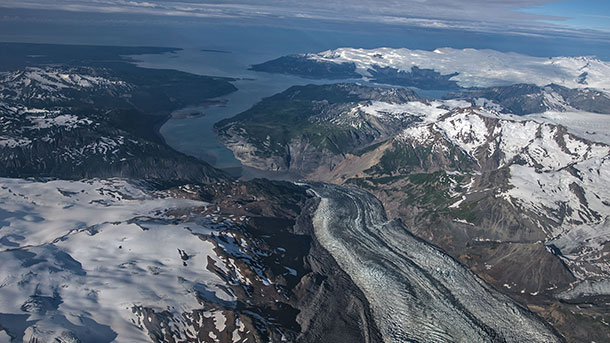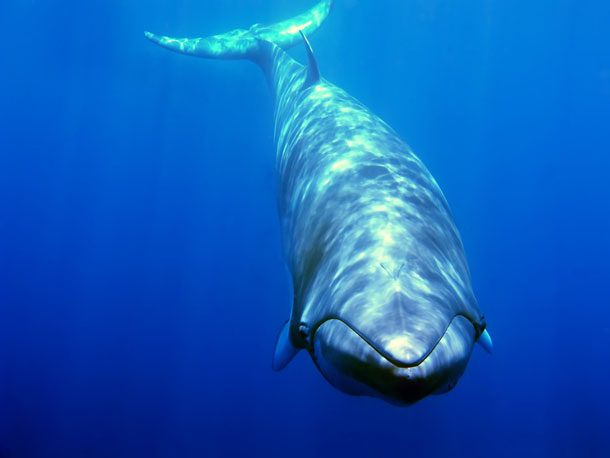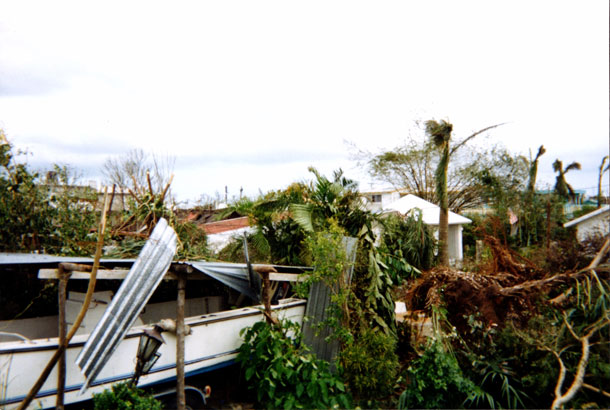Beyond The Headlines
Air Date: Week of September 14, 2018

Tyndall Glacier to Taan Fjord in Southeastern, Alaska. (Photo: Richard Droker, Flickr CC BY-NC-ND 2.0)
Peter Dykstra and Host Steve Curwood discuss why climate change may be linked to tsunamis, and they also look at the “research whaling” claims that allow the commercial killing of whales in Japan. The two then recount some of the deadliest hurricanes in modern US history.
Transcript
BASCOMB: It’s Living on Earth, I’m Bobby Bascomb.
CURWOOD: And I’m Steve Curwood.
Well, let’s take a look beyond the headlines now with Peter Dykstra. He’s an editor with Environmental Health News that’s EHN dot org and Daily Climate dot org. Hi there, Peter!
DYKSTRA: Hi Steve.
CURWOOD: Hey, this year’s intense fire and hurricane season have a lot of people talking about climate change. What do you have for us today?
DYKSTRA: I’ve got a study that links something that you wouldn’t expect to be linked to climate change at all, to another natural disaster -- tsunamis. This is in the journal Scientific Reports. They looked at two tsunamis that were caused by rockslides when rocks were exposed from melting glaciers. One of them was in 2017 in Greenland. The tsunami killed four people in a town 20 miles away from the rockslide and in 2015, there was another slide and tsunami from the Tyndall glacier in Southeastern Alaska.
CURWOOD: Well you never know what disrupting the climate will do. What else do you have for us today?
DYKSTRA: Commercial whaling was outlawed in the year 1986.
CURWOOD: Okay, but what why are we taking about it still today?

Minke whales, like the one pictured, have been hit particularly hard by whaling activity by Japan. (Photo: Wade Lehmann, Flickr CC BY-ND 2.0)
DYKSTRA: Because it never really ended. Japan has used a loophole in the commercial whaling ban, allowing for research whaling. Last year they killed 333 Minke whales in the Antarctic. It’s important to point out that Minke whales are not endangered, but there’s still an uproar about the reasons to kill whales at all in this day and age.
CURWOOD: So what’s the scientific research here?
DYKSTRA: Well after 32 years of research whaling, we’ve found out that these whales apparently died from large harpoon wounds, and when they’re taken back to Japan and prepared they are delicious.
CURWOOD: Hmm. So this is real science or junk science?
DYKSTRA: Well it’s clearly junk science, it’s been called a fraud, I would compare it to either clean coal or professional wrestling on the fraud scale.
CURWOOD: So what’s going on now about this?
DYKSTRA: The international whaling commission, the meeting in Brazil, and Japan is pushing the renewal of commercial whaling 32 years after we thought it was banned.
CURWOOD: Okay Peter, let’s take a look now into the history vault, what do you have for us this week?

The wreckage after Hurricane Gilbert slammed the Mexican coastline in 1988. (Photo: Scott Baldwin, Flickr CC BY-NC-ND 2.0)
DYKSTRA: Well with hurricanes much on our mind, let’s take a look at a few anniversaries, this being, mid-September being the peak of hurricane season. On the 8th and 9th of September in the year 1900, the Galveston Hurricane. The low-end death toll 6,000, the high-end death toll 12,000. One of the worst hurricane disasters in history. On September 12th in 2005, Michael Brown resigned as the director of FEMA. He of course, was the guy that George W. Bush had said was doing a “heckuva job” before all of the details about the absolute fiasco of the response to Hurricane Katrina were discovered.
CURWOOD: And there’s some others I guess?
DYKSTRA: There are. On the 12th and 13th in the year 1928, a hurricane came up through the Caribbean, killed about 1,000 people in Puerto Rico, and killed another 2500 people in lake Okeechobee in Florida. And then, in 1988 also on the 12th and 13th, this is the 30th anniversary of Hurricane Gilbert. Hurricane Gilbert rampaged through the Caribbean then up to Texas, killing a total of 319 people.
CURWOOD: And science is telling us that has the Atlantic ocean warms due to climate disruption, the warming world will see more and more of these stronger storms. Oh boy.
DYKSTRA: Oh boy indeed.
CURWOOD: Thanks Peter. Peter’s an editor with Environmental Health News, that’s EHN.org, and DailyClimate.org. We’ll talk to you again real soon.
DYKSTRA: Alright Steve, thanks, talk to you soon.
CURWOOD: And there’s more on these stories at our website, LOE.org.
Links
The Independent | "Melting glaciers increasing risk of landslide-triggered, tsunamis, study reveals"
Agence France Presse | "Pro- and anti-whaling nations set for clash in Brazil"
The Independent | "Japan slaughters 122 pregnant whales for 'scientific research'
CNN | George W. Bush’s infamous "Brownie, you're doing a heckuva job" comment
Living on Earth wants to hear from you!
Living on Earth
62 Calef Highway, Suite 212
Lee, NH 03861
Telephone: 617-287-4121
E-mail: comments@loe.org
Newsletter [Click here]
Donate to Living on Earth!
Living on Earth is an independent media program and relies entirely on contributions from listeners and institutions supporting public service. Please donate now to preserve an independent environmental voice.
NewsletterLiving on Earth offers a weekly delivery of the show's rundown to your mailbox. Sign up for our newsletter today!
 Sailors For The Sea: Be the change you want to sea.
Sailors For The Sea: Be the change you want to sea.
 The Grantham Foundation for the Protection of the Environment: Committed to protecting and improving the health of the global environment.
The Grantham Foundation for the Protection of the Environment: Committed to protecting and improving the health of the global environment.
 Contribute to Living on Earth and receive, as our gift to you, an archival print of one of Mark Seth Lender's extraordinary wildlife photographs. Follow the link to see Mark's current collection of photographs.
Contribute to Living on Earth and receive, as our gift to you, an archival print of one of Mark Seth Lender's extraordinary wildlife photographs. Follow the link to see Mark's current collection of photographs.
 Buy a signed copy of Mark Seth Lender's book Smeagull the Seagull & support Living on Earth
Buy a signed copy of Mark Seth Lender's book Smeagull the Seagull & support Living on Earth

